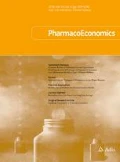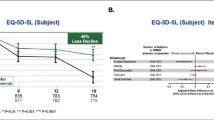Abstract
Objective: Cancer-related anaemia is associated with fatigue that adversely affects patients’ everyday functioning and wellbeing. We explore the impact of fatigue on patient productivity and caregiver burden.
Methods: The analyses are based on data from a randomised, open-label, active-controlled, dose-finding trial of darbepoetin alfa among solid-tumour cancer patients with anaemia, who are receiving chemotherapy. Fatigue is assessed with the Functional Assessment of Cancer Therapy (FACT)-Fatigue subscale score. Productivity and caregiver outcomes include time (hours) missed from usual activities, amount of assistance (hours) needed from others, overall ability to perform desired activities and ability to perform family responsibilities. These outcomes are assessed at baseline and the end of the 12-week treatment period. ANOVA and linear regression models are used to evaluate associations.
Results: Patients (n = 300) were aged 61 years on average, with a mean (SD) baseline haemoglobin of 9.9 (0.9) g/dL. FACT-Fatigue subscale score improvements were significantly (p = 0.003) associated with haemoglobin improvements. Over a 2-week period, after controlling for age, sex and disease progression, one-point improvements in FACT-Fatigue subscale scores corresponded to a 1-hour (95% CI 0.5, 1.5) gain in productive time, 0.7-hour (95% CI 0.4, 1.0) reduction in caregiver time and 1.6% (95% CI 1.4, 1.7) improvement in overall activity.
Conclusions: Reducing fatigue is associated with gains in productive time, reductions in caregiver burden and enhanced ability to perform activities. These outcomes may have broader implications for patients’ wellbeing and for the societal impact of cancer-related fatigue and anaemia.





Similar content being viewed by others
Notes
The use of trade names is for product identification purposes only and does not imply endorsement.
References
Groopman J, Itri L. Chemotherapy-induced anemia in adults: incidence and treatment. J Nall Cancer Just 1999; 91: 1616–34
Glaspy J, Bukowski R, Steinberg D, et al. Impact of therapy with epoetin alfa on clinical outcomes in patients with nonmyeloid malignancies during cancer chemotherapy in community oncology practice. J Clin Oncol 1997; 15: 1218–34
Littlewood TJ, Bajetta E, Nortier JAM, et al. Effects of epoetin alfa on hematologic parameters and quality of life in cancer patients receiving nonplatinum chemotherapy: results of a randomized, double-blind, placebo-controlled trial. J Clin Oncol 2001; 19: 2865–74
Demetri GD, Kris M, Wade J, et al. Quality-of-life benefit in chemotherapy patients treated with epoetin alfa is independent of disease response or tumour type: results from a prospective community oncology study. J Clin Oncol 1998; 16: 3412–25
Gabrilove JL, Cleeland CS, Livingston RB, et al. Clinical evaluation of once-weekly dosing of epoetin alfa in chemotherapy patients: improvements in haemoglobin and quality of life are similar to three-times-weekly dosing. J Clin Oncol 2001; 19: 2875–82
Richardson A. Fatigue in cancer patients: a review of the literature. Fur J Cancer Care (Engl) 1995; 4: 20–32
Curt G, Breitbart W, Cella D, et al. Impact of cancer-related fatigue on the lives of patients: new findings from the Fatigue Coalition. Oncologist 2000; 5: 353–60
Cella D, Peterman A, Passik S, et al. Progress toward guidelines for the management of fatigue. Oncology 1998; 12: 369–77
Lyman GH, Berndt ER, Kallich JD, et al. The economic burden of anemia in cancer patients receiving chemotherapy. Value Health 2005; 8 (2): 149–56
Berndt E, Crown W, Kallich J, et al. The impact of anaemia and its treatment on employee disability and medical costs. PharmacoEconomics 2005; 23 (2): 183–92
Glaspy J, Jadeja J, Justice G, et al. Darbepoetin alfa given every 1 or 2 weeks alleviates anaemia associated with cancer chemotherapy. Br J Cancer 2002; 87: 268–76
Cella D. The Functional Assessment of Cancer Therapy-Anemia (FACT-An) Scale: a new tool for the assessment of outcomes in cancer anemia and fatigue. Semin Hematol 1997; 34 Suppl. 2: 13–9
Cella D. Manual of the Functional Assessment of Chronic Illness Therapy (FACT) Scales, Version 4. Evanston (IL): Center on Outcomes Research and Education, Evanston Northwestern Healthcare and Northwestern University, 1997
Cella D, Lai J, Chang C, et al. Fatigue in cancer patients compared with fatigue in the general United States population. Cancer 2002; 94: 528–38
Cella D, Eton D, Lai J, et al. Combining anchor and distribution based methods to derive minimal clinically important differences on the Functional Assessment of Cancer Therapy (FACT) Anemia and Fatigue Scales. J Pain Symptom Manage 2002; 24: 547–61
Hedenus M, Adriansson M, San Miguel J, et al. Efficacy and safety of darbepoetin alfa in anaemic patients with lymphoproliferative malignancies: a randomized, double blind, placebo-controlled study. Br J Haematol 2003; 122: 394–403
Vansteenkiste J, Pirker R, Massuti B, et al. Double-blind, placebo-controlled, randomized phase III trial of darbepoetin alfa in lung cancer patients receiving chemotherapy. J Nall Cancer Inst 2002; 94: 1211–20
National Comprehensive Cancer Network, Inc. Clinical practice guidelines in oncology: cancer-related fatigue. Version 1, 2004 [online]. Available from URL: http://www.neen.org/professionals/physician-gls/PDF/fatigue.pdf [Accessed 2005 Mar 29]
Kallich J, Tchekmedyian NS, Damiano A, et al. Psychological outcomes associated with anemia-related fatigue in cancer patients. Oncology (Huntingt) 2002 Sep; 16 (9 Suppl. 10): 117–24
Barnett A, Cremieux PY, Fendrick AM, et al. Anemia-related costs for cancer patients. J Managed Care Med 2002; 6: 20–8
Osterborg A, Brandberg Y, Molostova V, et al. Randomized, double-blind, placebo-controlled trial of recombinant human erythropoietin, epoetin beta, in hematologic malignancies. J Clin Oncol 2002; 20: 2486–94
Acknowledgements
This research was supported by Amgen, Inc., Thousand Oaks, California, USA.
Ernst Berndt was responsible for the conceptual and statistical approach to the data and analysis, writing of sections and overall responsibility for content and analysis. Dr Berndt has had a consulting contract with Amgen, Inc. Anne McDermott and Xiao Xu were responsible for the statistical approach, writing of sections of the manuscript and completion of statistical analyses. Neither have individual conflicts of interest but both are employed by Covance Incorporated, which has contracts with Amgen, Inc. Howard Lee and John Glaspy were responsible for the clinical and conceptual approach to the data and analysis, writing of sections and editorial responsibilities. Drs Lee and Glaspy have no conflicts of interest. Joel Kallich was responsbile for the design and execution of the studies/patient-reported outcome data collection, conceptual and statistical approach to analysis and writing of sections. Dr Kallich is an employee of Amgen, Inc., Thousand Oaks, California, USA.
Author information
Authors and Affiliations
Corresponding author
Rights and permissions
About this article
Cite this article
Berndt, E., Kallich, J., McDermott, A. et al. Reductions in anaemia and fatigue are associated with improvements in productivity in cancer patients receiving chemotherapy. Pharmacoeconomics 23, 505–514 (2005). https://doi.org/10.2165/00019053-200523050-00009
Published:
Issue Date:
DOI: https://doi.org/10.2165/00019053-200523050-00009




